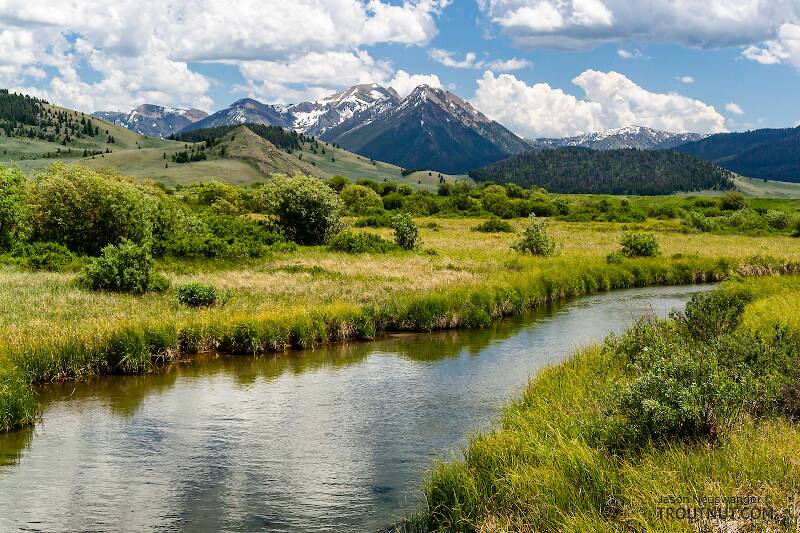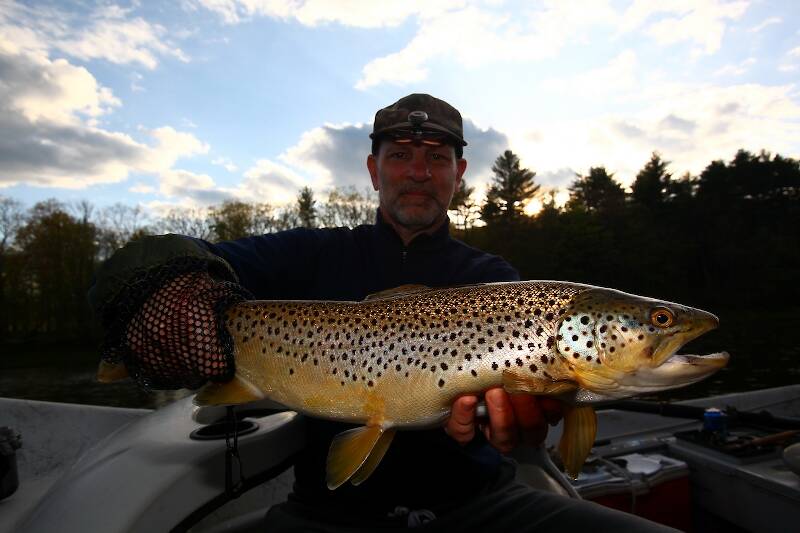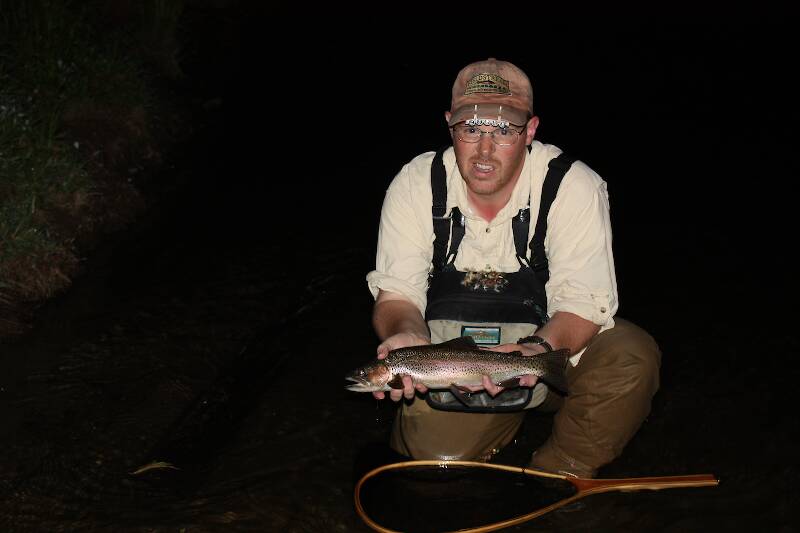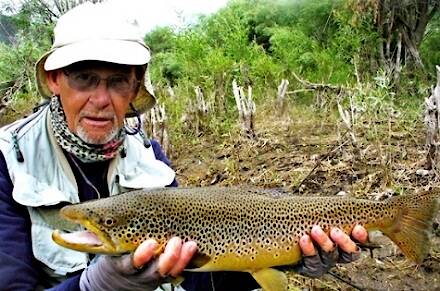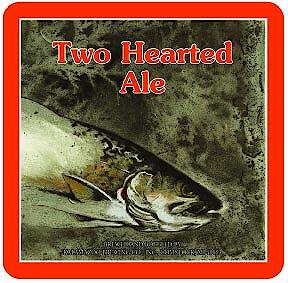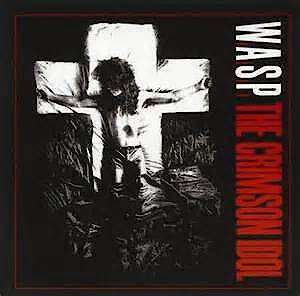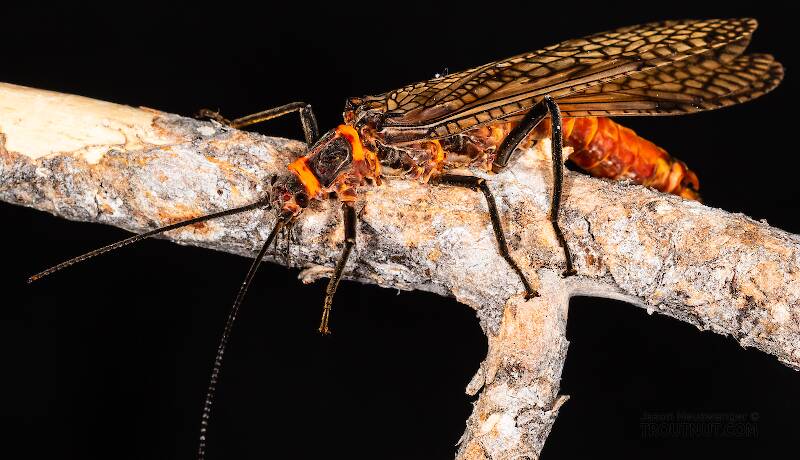
Salmonflies
Pteronarcys californica
The giant Salmonflies of the Western mountains are legendary for their proclivity to elicit consistent dry-fly action and ferocious strikes.
Featured on the forum
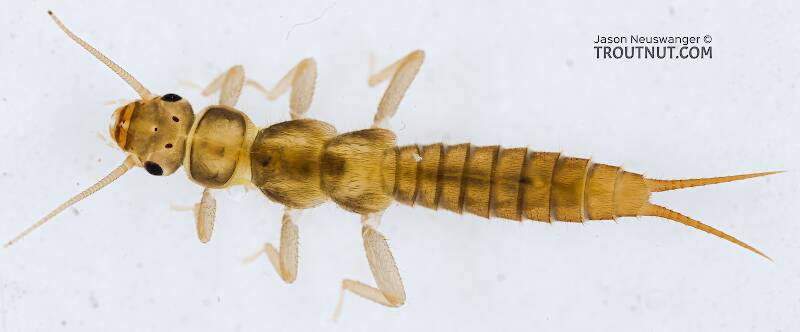
This species was fairly abundant in a February sample of the upper Yakima.

Troutnut is a project started in 2003 by salmonid ecologist Jason "Troutnut" Neuswanger to help anglers and
fly tyers unabashedly embrace the entomological side of the sport. Learn more about Troutnut or
support the project for an enhanced experience here.
Brooklover on Apr 23, 2008April 23rd, 2008, 11:52 am EDT
I finally am going to give fly fishing a serious go. What is a good affordable setup to start with for small streams. And what is the best way to learn? As far as flies go are the prepackaged flies that are sold in dicks any good? How do you guys identifie what insects the trout are eating when you arrive at a stream? I know i have along way to go but i want to learn to do this correct without forming bad habits. Any help is greatly appreciated.
Shawnny3 on Apr 23, 2008April 23rd, 2008, 1:35 pm EDT
This is a little like saying, "I finally am going to give drug abuse a serious go. What is a good affordable setup to start with for making small amounts of meth and crack? And what is the best way to shoot it up? As far as joints go are the prepackaged doobies that are sold in dorm rooms any good? How do you guys identify what trout the insects are eating when you are tripping on LSD? I know I have along way to go but i want to learn to do this correctly and form lots of bad habits. Any help is greatly appreciated."
Welcome to our little "club," Brooklover. It's a slippery slope, but it is fun while the bank account is still solvent. It's when you're crawling along the ground looking for the size-26 midge you dropped that you know you've finally hit rock bottom.
-Shawn
P.S. I'll defer to our many experts to give you proper instructions in the basics. But consider yourself fairly warned.
Welcome to our little "club," Brooklover. It's a slippery slope, but it is fun while the bank account is still solvent. It's when you're crawling along the ground looking for the size-26 midge you dropped that you know you've finally hit rock bottom.
-Shawn
P.S. I'll defer to our many experts to give you proper instructions in the basics. But consider yourself fairly warned.
Jewelry-Quality Artistic Salmon Flies, by Shawn Davis
www.davisflydesigns.com
www.davisflydesigns.com
Martinlf on Apr 23, 2008April 23rd, 2008, 2:11 pm EDT
I'd recommend getting a good casting coach to start. Those bad habits are the worst. Make sure you have the stroke down and practice, practice, practice. Lawn casting is fine and very relaxing once you get in the zen of it. For flies, go to a local shop and let them tell you what works for the waters you intend to fish. You'll save a lot by not getting things you'll never need. A good shop will help you get started with everything you need.
"He spread them a yard and a half. 'And every one that got away is this big.'"
--Fred Chappell
--Fred Chappell
LittleJ on Apr 23, 2008April 23rd, 2008, 9:08 pm EDT
brooklover,
If the shop you go to sells TFO rods i'd def. give the TFO Pro a test drive it's a very good rod for the money( plus they come in every shape and size). I started w/ a cabelas outfit they are pretty reasonable. I think they sell a genesis outfit for around a $120 that comes w/ a variety of useable stuff. Stay away from chain store flies!
Jeff
If the shop you go to sells TFO rods i'd def. give the TFO Pro a test drive it's a very good rod for the money( plus they come in every shape and size). I started w/ a cabelas outfit they are pretty reasonable. I think they sell a genesis outfit for around a $120 that comes w/ a variety of useable stuff. Stay away from chain store flies!
Jeff
Troutnut on Apr 24, 2008April 24th, 2008, 5:06 am EDT
I'll echo what others have said -- stay away from big sports stores if possible and get your flies from a local fly shop. Tell them where and when you'll be fishing and they'll have good suggestions for you.
I'll defer to others' expertise about rods. Mine are from St. Croix and Orvis and I like them, but I've heard many good things about TFO (Temple Fork Outfitters) and they're cheaper. Be sure you tell the salesman in the fly shop that you're new and looking for an all-around trout rod to learn on.
I see you're in Chester County, PA. We have lots of PA fishermen here... can anyone tell this guy where the best local fly shop is?
Also, I recommend reading "The Orvis Guide to Fly Fishing for Trout" by Tom Rosenbauer. I started fly fishing about 4 years ago and that's one of the first books I read, and it was one of the most helpful. It'll teach you the basics of "reading the water" to locate fish and knowing how your fly should be presented to them. I think there's another book by Rosenbauer about "reading the water" that is also a good early investment.
I'll defer to others' expertise about rods. Mine are from St. Croix and Orvis and I like them, but I've heard many good things about TFO (Temple Fork Outfitters) and they're cheaper. Be sure you tell the salesman in the fly shop that you're new and looking for an all-around trout rod to learn on.
I see you're in Chester County, PA. We have lots of PA fishermen here... can anyone tell this guy where the best local fly shop is?
Also, I recommend reading "The Orvis Guide to Fly Fishing for Trout" by Tom Rosenbauer. I started fly fishing about 4 years ago and that's one of the first books I read, and it was one of the most helpful. It'll teach you the basics of "reading the water" to locate fish and knowing how your fly should be presented to them. I think there's another book by Rosenbauer about "reading the water" that is also a good early investment.
Jason Neuswanger, Ph.D.
Troutnut and salmonid ecologist
Troutnut and salmonid ecologist
Shawnny3 on Apr 24, 2008April 24th, 2008, 12:46 pm EDT
Sorry for the initial smart-ass remarks, Brooklover. I usually just spout off the first thing that comes to mind. It doesn't serve me much better now than it did in grade school.
Others have given good advice. Another good company for starter rods is Cortland. They specialize in affordable, good quality equipment. My feeling is that until your equipment limits your performance more than your own lack of ability does, there is no good reason to step up to something better. I recently saw a nice Cortland starter rod, reel, and line combo retailing about $140. The line on the reel was 444, line that normally retails around $45 per spool. If they're willing to put that line in the combo, I'm sure it's an adequate rod and reel for a beginner.
Make sure you get a rod and line weight that suits the water you intend to fish. If you like to fish really small water, you might want to go as low as a 3-wt, but that could make casting any distance a challenge at first. The most versatile rod and line, in my opinion, is 5-wt. That will allow you to comfortably fish for trout in all but the tightest venues. A good compromise might be a 4-wt, but I wouldn't recommend lighter than that for a beginner. Again, though, that's just me.
As for flies, it is worth the extra money to buy them from a reputable fly shop. Don't spend $100 on flies in a shop, though, before you've fished a few of their flies first. Even good shops often import their flies from who-knows-where, and they may or may not be worth the asking price. Try a few of them first and make sure they don't fall apart after a fish or two (that might prove a frustratingly difficult test to administer, though!). All patterns have different durability, but I expect my hooks to wear out before the fly that's tied on them does.
Finally, if you want to upgrade from recreational experimentation to full-fledged heroinesque addiction, start tying your own flies. I outfitted my brother to tie his 12 favorite patterns for less than $100, including vise and hooks - it can be done on the cheap if you ONLY BUY WHAT YOU NEED. Then, as your needs and (mostly) wants dictate, you can add to your repertoire of materials. Even if you still buy certain flies from the shop, there is simply no reason to be purchasing things like muskrat nymphs, shrimp, and Walt's worms (and you could consistently catch fish on those three flies on virtually every stream in PA). Good dry fly necks are very expensive, so you may want to buy your dries in a shop at first, but they do sell small bags of quality hackle that you can use to cut your teeth on dries before you decide whether to dive into the money pit of quality necks.
One last last thing. Going into your average flyshop is much like going into your average car dealership. If you walk in with $1000 to blow, the salesman will be more than happy to oblige you. So know how much you're willing to spend in TOTAL before you walk through the door, and make that clear to whomever is helping you. There are ways to blow a LOT of cash on flyfishing (like buying my flies), but you don't HAVE to blow a lot of cash to be able to thoroughly enjoy the sport, so don't let anyone convince you that you do.
-I'm Shawn and I am an addict.
Others have given good advice. Another good company for starter rods is Cortland. They specialize in affordable, good quality equipment. My feeling is that until your equipment limits your performance more than your own lack of ability does, there is no good reason to step up to something better. I recently saw a nice Cortland starter rod, reel, and line combo retailing about $140. The line on the reel was 444, line that normally retails around $45 per spool. If they're willing to put that line in the combo, I'm sure it's an adequate rod and reel for a beginner.
Make sure you get a rod and line weight that suits the water you intend to fish. If you like to fish really small water, you might want to go as low as a 3-wt, but that could make casting any distance a challenge at first. The most versatile rod and line, in my opinion, is 5-wt. That will allow you to comfortably fish for trout in all but the tightest venues. A good compromise might be a 4-wt, but I wouldn't recommend lighter than that for a beginner. Again, though, that's just me.
As for flies, it is worth the extra money to buy them from a reputable fly shop. Don't spend $100 on flies in a shop, though, before you've fished a few of their flies first. Even good shops often import their flies from who-knows-where, and they may or may not be worth the asking price. Try a few of them first and make sure they don't fall apart after a fish or two (that might prove a frustratingly difficult test to administer, though!). All patterns have different durability, but I expect my hooks to wear out before the fly that's tied on them does.
Finally, if you want to upgrade from recreational experimentation to full-fledged heroinesque addiction, start tying your own flies. I outfitted my brother to tie his 12 favorite patterns for less than $100, including vise and hooks - it can be done on the cheap if you ONLY BUY WHAT YOU NEED. Then, as your needs and (mostly) wants dictate, you can add to your repertoire of materials. Even if you still buy certain flies from the shop, there is simply no reason to be purchasing things like muskrat nymphs, shrimp, and Walt's worms (and you could consistently catch fish on those three flies on virtually every stream in PA). Good dry fly necks are very expensive, so you may want to buy your dries in a shop at first, but they do sell small bags of quality hackle that you can use to cut your teeth on dries before you decide whether to dive into the money pit of quality necks.
One last last thing. Going into your average flyshop is much like going into your average car dealership. If you walk in with $1000 to blow, the salesman will be more than happy to oblige you. So know how much you're willing to spend in TOTAL before you walk through the door, and make that clear to whomever is helping you. There are ways to blow a LOT of cash on flyfishing (like buying my flies), but you don't HAVE to blow a lot of cash to be able to thoroughly enjoy the sport, so don't let anyone convince you that you do.
-I'm Shawn and I am an addict.
Jewelry-Quality Artistic Salmon Flies, by Shawn Davis
www.davisflydesigns.com
www.davisflydesigns.com
Smallstream on Apr 25, 2008April 25th, 2008, 10:56 am EDT
shawnny,
your first post on this topic was hilarious but very true at the same time lol
your first post on this topic was hilarious but very true at the same time lol
Brooklover on Apr 28, 2008April 28th, 2008, 8:39 am EDT
Thanks guys I appreciate it. Im hoping to have a somewhat half decent cast down before i head to MT in late summer early fall but undoubtedly will still be making plenty of bad casts. I think ill go with a 5 wt since it has versatility.
JOHNW on Apr 28, 2008April 28th, 2008, 9:24 am EDT
Booklover,
If you plan on fishing this outfit in MT I might suggest you go more toward a six weight. THe rivers out west are generally speaking larger and more prone to moderate to big wind right in your face. The extra beef would serve you well. I find it easier to gently present a fly with a big rod than to muscle a lighter rod in tough conditions.
Seeing as you are in Chester Co. you may want to try and get to one of the TCO stores down that way (they seem to be popping up all over the place). The staff is pretty knowledgeable and they carry a fairly wide range of products.
Finally if the clerk starts heading you to the $400+ rods say thanks and head else where as he is thinking of his comission and not your needs. There are many good rods out there at a reasonable price just get out and cast them and see what feels good to you.
JW
If you plan on fishing this outfit in MT I might suggest you go more toward a six weight. THe rivers out west are generally speaking larger and more prone to moderate to big wind right in your face. The extra beef would serve you well. I find it easier to gently present a fly with a big rod than to muscle a lighter rod in tough conditions.
Seeing as you are in Chester Co. you may want to try and get to one of the TCO stores down that way (they seem to be popping up all over the place). The staff is pretty knowledgeable and they carry a fairly wide range of products.
Finally if the clerk starts heading you to the $400+ rods say thanks and head else where as he is thinking of his comission and not your needs. There are many good rods out there at a reasonable price just get out and cast them and see what feels good to you.
JW
"old habits are hard to kill once you have gray in your beard" -Old Red Barn
Wbranch on Apr 28, 2008April 28th, 2008, 3:03 pm EDT
Booklover,
If you live anywhere near York, PA PM me and if you want I'll go with you shopping someplace when you are ready to buy an outfit and I'll get you through the glitter to find a good setup for your immediate needs. Also I'd be more than happy to give you some basic casting lessons and cover the most common knots you should know.
JohnW wrote -
"If you plan on fishing this outfit in MT I might suggest you go more toward a six weight."
IMHO if Booklover has the funds to buy multiple rods then by all means one of them should be a six weight. However for the beginner and even one who might fish Montana this year I'd still recommend the five weight and just buy an extra spool for his reel and load it with a WF #6 floater. You can go up, or down, on just about every rod I've ever picked up. It is a lot easier to go one line heavier for a novice so I think this would be better for BL in the long run as a five weight is so much lighter and finer for smaller streams and flies than a six weight.
If you live anywhere near York, PA PM me and if you want I'll go with you shopping someplace when you are ready to buy an outfit and I'll get you through the glitter to find a good setup for your immediate needs. Also I'd be more than happy to give you some basic casting lessons and cover the most common knots you should know.
JohnW wrote -
"If you plan on fishing this outfit in MT I might suggest you go more toward a six weight."
IMHO if Booklover has the funds to buy multiple rods then by all means one of them should be a six weight. However for the beginner and even one who might fish Montana this year I'd still recommend the five weight and just buy an extra spool for his reel and load it with a WF #6 floater. You can go up, or down, on just about every rod I've ever picked up. It is a lot easier to go one line heavier for a novice so I think this would be better for BL in the long run as a five weight is so much lighter and finer for smaller streams and flies than a six weight.
Catskill fly fisher for fifty-five years.
JOHNW on Apr 29, 2008April 29th, 2008, 9:29 am EDT
WBranch,
Good point. However I'll stick by my 6#. My personal opinion is that the 6# is probably the most versatile out there as it gives you backbone to fish big (both wathers and flies) and still can work in all but the most delicate of settings. As always user milage may vary.
JW
Good point. However I'll stick by my 6#. My personal opinion is that the 6# is probably the most versatile out there as it gives you backbone to fish big (both wathers and flies) and still can work in all but the most delicate of settings. As always user milage may vary.
JW
"old habits are hard to kill once you have gray in your beard" -Old Red Barn
Keystoner on Jul 17, 2011July 17th, 2011, 7:03 pm EDT
Thomas McGuane has written "a 8 1/2ft 6 wt is the best overall trout rod" which I happen to agree with. I would also recommend going with a TFO. They seem to be the best overall value for the money. Really it's all about what YOU want. I've had a lot of people scoff at my 5 & 6 weights and say "That's WAY too heavy for here!!" But you know what, the fish didn't seem to notice. Granted, I waaas nymphing.
Other than that, be wary of the shop guy. It depends on who the guy is, but some will try to take advantage and sell you the store. Some will really help you out. My advice would be to buy as little as you possibly can and then add things as YOU see fit. Don't let anyone tell you you NEED (or don't need) anything. Rod, reel, backing, line, leaders, and a few flies will get you started. I would advise nymphs to start.
Also a few books I would recommend...
Field & Stream's "Fishing Knots"
Lefty Kreh's "Presenting the Fly"
Thomas McGuanes "The longest silence. A life in fishing" *just a great bunch of stories*
Also if you can, take WBranch up on his casting lessons. Just my thoughts, take what you want or leave it all. Best of luck in any case, and welcome.
P.S. Feel free to message me about anything. I am by no means the sharpest guy on here but I will certainly help when I can.
Other than that, be wary of the shop guy. It depends on who the guy is, but some will try to take advantage and sell you the store. Some will really help you out. My advice would be to buy as little as you possibly can and then add things as YOU see fit. Don't let anyone tell you you NEED (or don't need) anything. Rod, reel, backing, line, leaders, and a few flies will get you started. I would advise nymphs to start.
Also a few books I would recommend...
Field & Stream's "Fishing Knots"
Lefty Kreh's "Presenting the Fly"
Thomas McGuanes "The longest silence. A life in fishing" *just a great bunch of stories*
Also if you can, take WBranch up on his casting lessons. Just my thoughts, take what you want or leave it all. Best of luck in any case, and welcome.
P.S. Feel free to message me about anything. I am by no means the sharpest guy on here but I will certainly help when I can.
"Out into the cool of the evening, strolls the Pretender. He knows that all his hopes and dreams, begin and end there." -JB
Adirman on Jul 18, 2011July 18th, 2011, 3:44 am EDT
When I first got started, I just bought one of those cheapo Walmart rod/reel combos where everything is all set up prior for like $80. I figured that if I didn't like it in the long run, I wouldn't have invested a ton of $$. And, if I did(which is now obvious!), I can always upgrade!! I had that w/ a handful Walmart flies to start and caught some fish so you can too!
Quick Reply
Related Discussions
Topic
Replies
Last Reply
Re: if bass and carp are o.k., what about tarpon and permit? Featured Topic
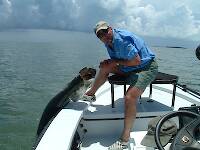
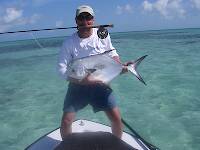
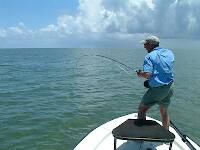
In the Photography Board by Gutcutter



In the Photography Board by Gutcutter
4
Feb 24, 2010
by Gutcutter
by Gutcutter

